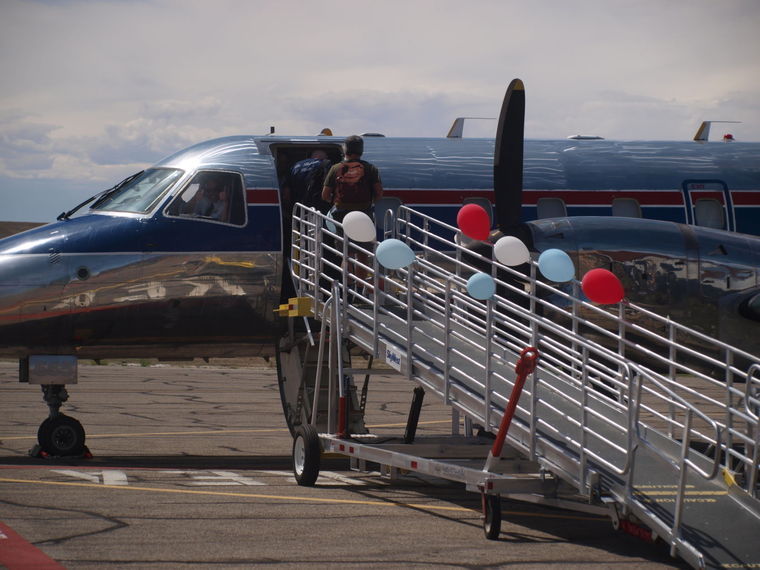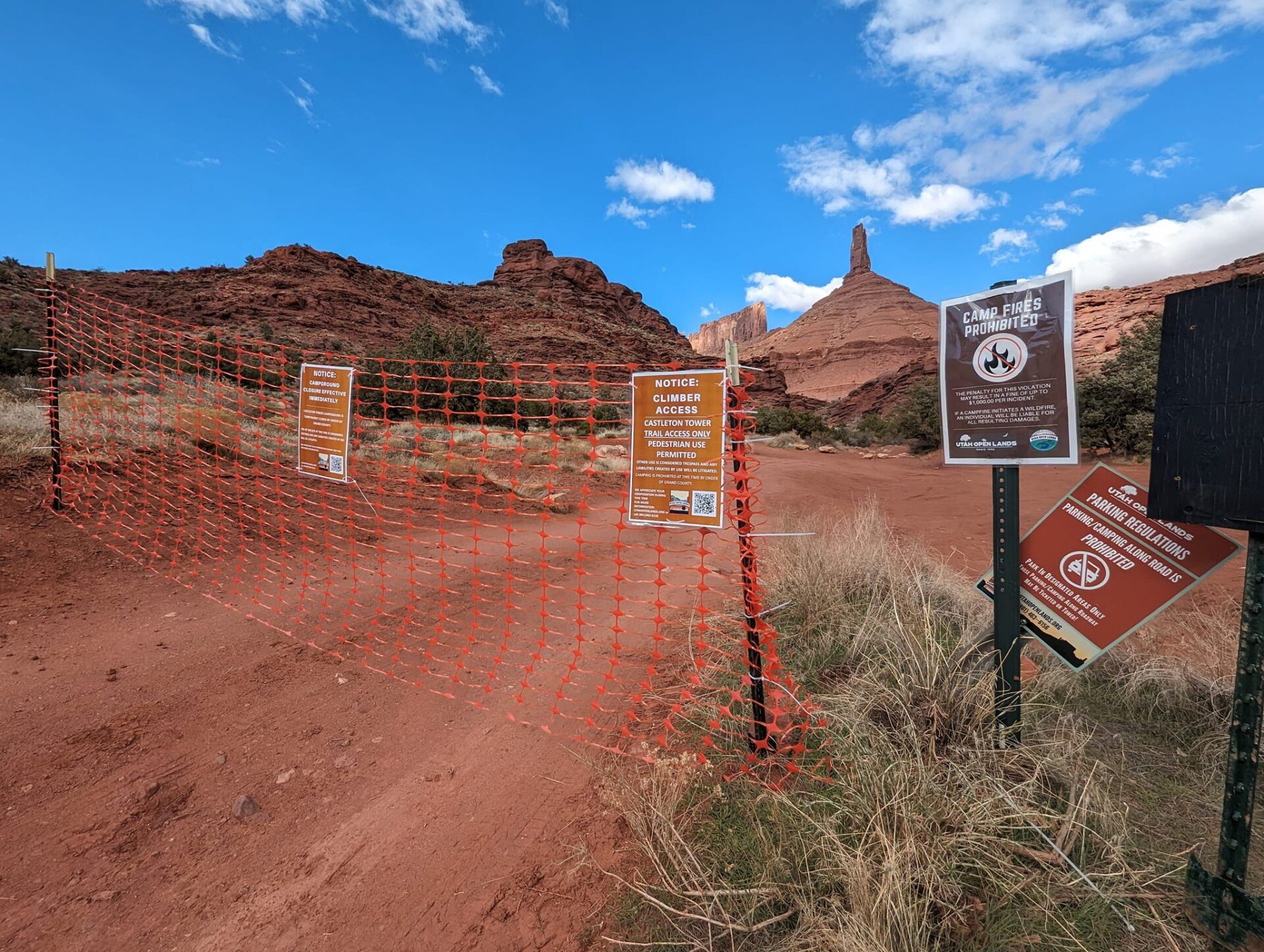Federal transportation officials are done waiting for Great Lakes Aviation to begin passenger airline service to Canyonlands Field Airport. The airline, meanwhile, says it is currently uninterested in providing those flights.
After a five-month gap in service, the U.S. Department of Transportation announced this week that it is seeking proposals from 30-plus seat carriers that would offer 12 weekly round-trip flights to and from Moab’s airport. The agency says it will consider proposals for additional flights if bidders operate smaller aircraft with up to nine seats.
Responses are due by late October, and it’s unlikely that Great Lakes will be among the bidders.
Great Lakes CEO Doug Voss said the company’s plans have changed since the airport lost its Transportation Security Administration (TSA) status – a loss that occurred due to the lack of Great Lakes service, according to the TSA and the transportation department.
“For Great Lakes, a prerequisite to a bid is that either the TSA or a contractor needs to have the capability of screening at an airport,” Voss said.
As recently as last month, the Cheyenne, Wyoming-based airline told airport officials and community leaders that it planned to begin the long-delayed service at Canyonlands Field on Thursday, Oct. 1.
“(But) the ‘defederalization’ of the screening services has influenced our interest in providing (Essential Air Service),” Voss said.
If there’s a speedy resolution to the TSA screening issue, Voss said the company would take a look at the transportation department’s requests for proposals. But under the current circumstances, he said, it’s unlikely that will happen.
With Great Lakes seemingly out of the picture, at least two small but serious contenders are eager to begin service at Canyonlands Field. They include San Francisco-based Boutique Air, which operates nine-seat Pilatus PC-12 aircraft, and Utah Airways of Ogden, which operates PA-31 Piper Navajo aircraft that seat up to six passengers.
Grand County Airport Manager Judd Hill said the latter airline is ready to launch unsubsidized service between Moab and Salt Lake City at once, and may consider another route, as well.
“The owner/ operators of this company believe that Moab is a community worth providing service to, and if proven correct, they will also explore the possibility of weekend flights to and from Las Vegas,” Hill said in a Sept. 29 update to local media outlets and officials.
The Grand County Airport Board is set to review a contract with Utah Airways on Monday, Oct. 5, and if the Grand County Council approves it the following day, flights could begin within the next one to two weeks, Hill said.
At the same time, others in the community are hoping that Boutique Air can fill a void in local passenger service.
The company has a history of launching flights in communities where Great Lakes previously operated, including airports in Chadron, Nebraska, and Show Low, Arizona.
Chadron Public Works Director Milo Rust said Great Lakes developed a reputation for unreliable service in his community, and he’s pleased with the switch to Boutique, which offers three daily flights to and from Denver for about $100 round-trip.
“You couldn’t rely on (Great Lakes) to buy a ticket and fly out the same day, let alone the same week,” he said. “Having Boutique here is very nice for us.”
Grand County Airport Board member Bob Greenberg said he believes that Boutique stands a good chance of winning a new Essential Air Service contract.
“Boutique Air is really the most likely player, because they’re already an on-demand charter service,” he said.
Even if the transportation department selects another carrier, Greenberg said that any service is better than no service at all.
Much of the problem in finding a larger carrier has to do with the fact that the airport’s existing runway is too small to accommodate bigger regional jet service aircraft.
“Unfortunately, there are not that many airline carriers in the West that could serve us at this time,” Hill said. “That’s why we need a bigger runway.”
To that end, the Federal Aviation Administration (FAA) recently approved the airport’s master plan for its runway expansion project, and Hill anticipates that construction work is on track to begin in late 2016 or early 2017.
In the meantime, Hill and other officials have been actively working with the Essential Air Service program to find other options for local air service. Now that the program has launched a new bidding process, U.S. Department of Transportation Public Affairs Specialist Caitlin Harvey said her agency will be paying close attention to input from community leaders.
“The department always encourages local officials to reach out to potential carriers and explain their needs and wants in terms of air service, so that when (a request for proposals) is released, those carriers can respond efficiently and in a way that meets the communities’ needs and expectations,” she told the Moab Sun News.
Airport has troubled history with Great Lakes
Canyonlands Field has been without passenger airline service ever since SkyWest Airlines’ last outbound flight departed for Salt Lake City on April 30.
Under the terms of its two-year Essential Air Service contract, Great Lakes was set to begin service between Moab and Denver International Airport on May 1. When its service didn’t begin on schedule, Great Lakes officials revised the airline’s potential start-dates several times, but those dates have come and gone without any passenger flights.
In September, for instance, Hill said that former Great Lakes CEO Chuck Howell committed to an Oct. 1 start date. Just one week later, though, Howell backtracked and said the airline could not begin local service until the airport is refederalized, according to Hill.
“Which means the earliest that we could foresee (Great Lakes) service is the springtime of 2016,” he said.
Greenberg said he’s very disappointed with the predictable way that events unfolded.
“This is kind of our own worst fear about Great Lakes that has been realized in spades,” he said.
Airport board members were well aware of the company’s record of flight delays and cancellations, according to Greenberg.
“We recognized that they weren’t the best partner that we had,” he said.
Yet despite the company’s “less-than-stellar” history at Canyonlands Field and other airports, Hill said that local officials supported Great Lakes’ bid for two key reasons.
During the previous bidding process, Great Lakes was the only company that gave passengers the option of booking multiple flights with its airline partners. More importantly, perhaps, the selection of the larger carrier allowed the airport to retain its TSA status.
If airport and county officials opted to support one of the rival bidders, TSA would have withdrawn from Canyonlands Field on May 1, and the airport would have lost its federal security screeners at that time.
“(We) wanted to avoid the extended process of refederalizing (the) screening of passengers and the loss of local jobs,” Hill said. “Unfortunately, the local-based federal employees were separated anyway and TSA has told us that they have defederalized services because of the lack of service from Great Lakes.”
The Vernal Regional Airport in Uintah County has faced similar delays in start-dates.
“(A) lot of damage has been done to our communities [by Great Lakes],” Vernal Regional Airport Manager Kelly Harvey said in an email to the transportation department.
The department, in turn, acknowledges that both communities are “understandably frustrated” by the lack of service or communication from Great Lakes.
Word of the transportation department’s announcement came as news that Great Lakes defaulted on a $27.5 million loan began to circulate beyond the company’s home base in Wyoming.
The company linked its financial situation and its weak performance in the first half of 2015 to congressionally approved regulations that require pilots to have 1,500 hours of flight-time experience. The effect of the rules has been “severe,” the company said, leading to an industry-wide shortage of qualified pilots, and having a negative impact on Great Lakes’ operations and its financial situation.
“The pilot shortage and its effect on operations are expected to continue until we can hire and train enough pilots to reestablish operations in those markets in which we were forced to suspend service or expand into new markets,” the company said in its filings with the U.S. Securities and Exchange Commission (SEC).
Great Lakes says it’s unlikely to submit new contract proposal
This is kind of our own worst fear about Great Lakes that has been realized in spades.




